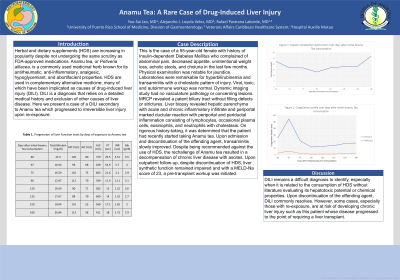Monday Poster Session
Category: Liver
P2572 - Anamu Tea: A Rare Case of Drug-Induced Liver Injury
Monday, October 23, 2023
10:30 AM - 4:15 PM PT
Location: Exhibit Hall

Has Audio

Yue-Sai Jao, MD
University of Puerto Rico School of Medicine
San Juan, PR
Presenting Author(s)
Yue-Sai Jao-Ayala, MD1, Alejandro J.. Loyola-Velez, MD2, Rafael Pastrana-Laborde, MD3
1University of Puerto Rico Medical Sciences Campus, San Juan, Puerto Rico; 2VA Caribbean Healthcare System, Isabela, Puerto Rico; 3Auxilio Mutuo Hospital, San Juan, Puerto Rico
Introduction: Herbal and dietary supplements (HDS) are increasing in popularity despite not undergoing the same scrutiny as FDA-approved medications. Anamu tea, or Petiveria alliacea, is a commonly used medicinal herb known for its antirheumatic, anti-inflammatory, analgesic, hypoglycemiant, and abortifacient properties. HDS are used in complementary alternative medicine; many of which have been implicated as causes of drug-induced liver injury (DILI). DILI is a diagnosis that relies on a detailed medical history and exclusion of other causes of liver disease. Here we present a case of a DILI secondary to Anamu tea which progressed to irreversible liver injury upon re-exposure.
Case Description/Methods: This is the case of a 55-year-old female with history of Insulin-dependent Diabetes Mellitus who complained of abdominal pain, decreased appetite, unintentional weight loss, acholic stools, and choluria in the last few months. Physical examination was notable for jaundice. Laboratories were remarkable for hyperbilirubinemia and transaminitis with a cholestatic pattern of injury. Viral, toxic, and autoimmune workup was normal. Dynamic imaging study had no vasculature pathology or concerning lesions. MRCP revealed a patent biliary tract without filling defects or strictures. Liver biopsy revealed hepatic parenchyma with acute and chronic inflammatory infiltrate and periportal marked ductular reaction with periportal and periductal inflammation consisting of lymphocytes, occasional plasma cells, eosinophils, and neutrophils with cholestasis. On rigorous history-taking, it was determined that the patient had recently started taking Anamu tea. Upon admission and discontinuation of the offending agent, transaminitis slowly improved. Despite being recommended against the use of HDS, the rechallenge of Anamu tea resulted in a decompensation of chronic liver disease with ascites. Upon outpatient follow-up, despite discontinuation of HDS, liver synthetic function remained impaired and with a MELD-Na score of 23, a pre-transplant workup was initiated.
Discussion: DILI remains a difficult diagnosis to identify, especially when it is related to the consumption of HDS without literature evaluating its hepatotoxic potential or chemical properties. Upon discontinuation of the offending agent, DILI commonly resolves. However, some cases, especially those with re-exposure, are at risk of developing chronic liver injury such as this patient whose disease progressed to the point of requiring a liver transplant.
Disclosures:
Yue-Sai Jao-Ayala, MD1, Alejandro J.. Loyola-Velez, MD2, Rafael Pastrana-Laborde, MD3. P2572 - Anamu Tea: A Rare Case of Drug-Induced Liver Injury, ACG 2023 Annual Scientific Meeting Abstracts. Vancouver, BC, Canada: American College of Gastroenterology.
1University of Puerto Rico Medical Sciences Campus, San Juan, Puerto Rico; 2VA Caribbean Healthcare System, Isabela, Puerto Rico; 3Auxilio Mutuo Hospital, San Juan, Puerto Rico
Introduction: Herbal and dietary supplements (HDS) are increasing in popularity despite not undergoing the same scrutiny as FDA-approved medications. Anamu tea, or Petiveria alliacea, is a commonly used medicinal herb known for its antirheumatic, anti-inflammatory, analgesic, hypoglycemiant, and abortifacient properties. HDS are used in complementary alternative medicine; many of which have been implicated as causes of drug-induced liver injury (DILI). DILI is a diagnosis that relies on a detailed medical history and exclusion of other causes of liver disease. Here we present a case of a DILI secondary to Anamu tea which progressed to irreversible liver injury upon re-exposure.
Case Description/Methods: This is the case of a 55-year-old female with history of Insulin-dependent Diabetes Mellitus who complained of abdominal pain, decreased appetite, unintentional weight loss, acholic stools, and choluria in the last few months. Physical examination was notable for jaundice. Laboratories were remarkable for hyperbilirubinemia and transaminitis with a cholestatic pattern of injury. Viral, toxic, and autoimmune workup was normal. Dynamic imaging study had no vasculature pathology or concerning lesions. MRCP revealed a patent biliary tract without filling defects or strictures. Liver biopsy revealed hepatic parenchyma with acute and chronic inflammatory infiltrate and periportal marked ductular reaction with periportal and periductal inflammation consisting of lymphocytes, occasional plasma cells, eosinophils, and neutrophils with cholestasis. On rigorous history-taking, it was determined that the patient had recently started taking Anamu tea. Upon admission and discontinuation of the offending agent, transaminitis slowly improved. Despite being recommended against the use of HDS, the rechallenge of Anamu tea resulted in a decompensation of chronic liver disease with ascites. Upon outpatient follow-up, despite discontinuation of HDS, liver synthetic function remained impaired and with a MELD-Na score of 23, a pre-transplant workup was initiated.
Discussion: DILI remains a difficult diagnosis to identify, especially when it is related to the consumption of HDS without literature evaluating its hepatotoxic potential or chemical properties. Upon discontinuation of the offending agent, DILI commonly resolves. However, some cases, especially those with re-exposure, are at risk of developing chronic liver injury such as this patient whose disease progressed to the point of requiring a liver transplant.
Disclosures:
Yue-Sai Jao-Ayala indicated no relevant financial relationships.
Alejandro Loyola-Velez indicated no relevant financial relationships.
Rafael Pastrana-Laborde: Abbvie – Speaker for Mavyret.
Yue-Sai Jao-Ayala, MD1, Alejandro J.. Loyola-Velez, MD2, Rafael Pastrana-Laborde, MD3. P2572 - Anamu Tea: A Rare Case of Drug-Induced Liver Injury, ACG 2023 Annual Scientific Meeting Abstracts. Vancouver, BC, Canada: American College of Gastroenterology.
